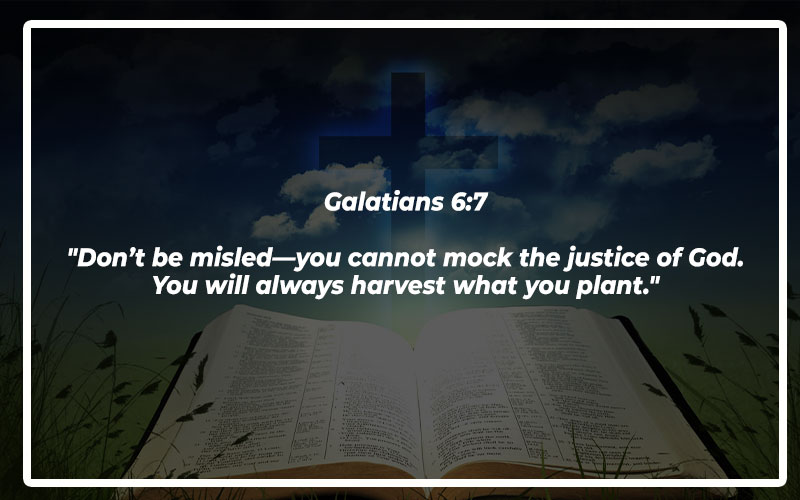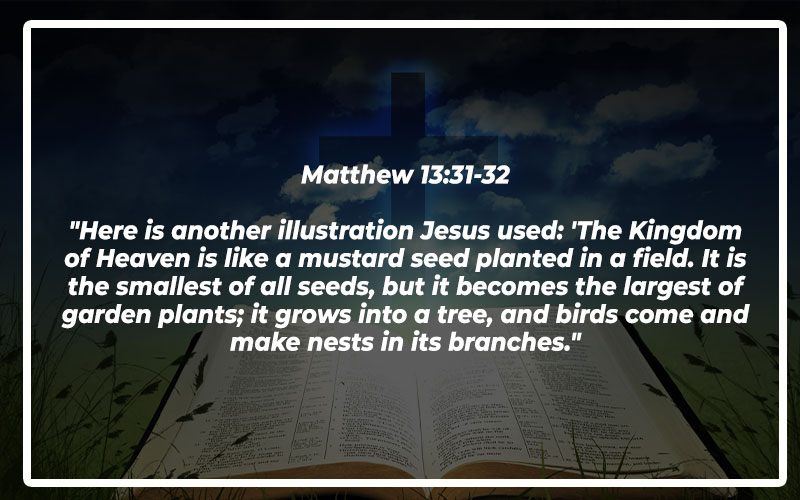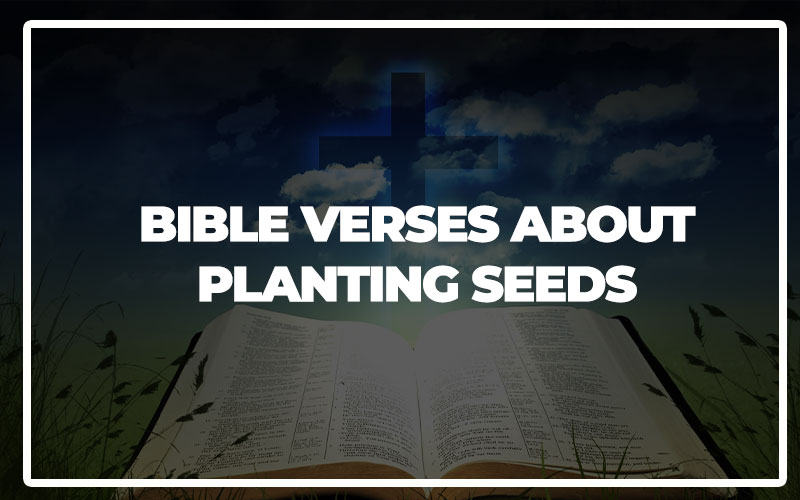Planting seeds is a powerful metaphor in the Bible that symbolizes the act of spreading faith, love, and righteousness. Just as seeds need nurturing to grow, so too do our spiritual lives require care, attention, and trust in God’s timing. Here, we explore various scriptures that speak to the significance of planting seeds, offering guidance on how to live a fruitful Christian life.
Also Read: Bible Verses About Seeds
The Principle of Sowing and Reaping
The Bible teaches that the actions we take are like seeds that will eventually produce a harvest. This principle reminds us that our deeds, whether good or bad, will bear fruit in due season.
Galatians 6:7
“Don’t be misled—you cannot mock the justice of God. You will always harvest what you plant.”

This verse emphasizes the inevitable connection between our actions and their consequences. Just as a farmer expects to reap what he has sown, so too must we understand that our choices will bring about results in our lives.
2 Corinthians 9:6
“Remember this—a farmer who plants only a few seeds will get a small crop. But the one who plants generously will get a generous crop.”
Paul’s words here encourage generosity, illustrating that the more we give of ourselves—whether through kindness, love, or resources—the more we will receive in return. God rewards a generous heart.
Proverbs 22:8
“Those who plant injustice will harvest disaster, and their reign of terror will come to an end.”
This verse serves as a warning that evil actions will not go unpunished. Planting seeds of injustice or wickedness will ultimately lead to a destructive harvest.
Hosea 10:12
“I said, ‘Plant the good seeds of righteousness, and you will harvest a crop of love. Plow up the hard ground of your hearts, for now is the time to seek the Lord, that he may come and shower righteousness upon you.’”
Here, the prophet Hosea urges us to cultivate righteousness in our lives. By seeking God and allowing Him to soften our hearts, we open ourselves up to a bountiful harvest of His love and grace.
Job 4:8
“My experience shows that those who plant trouble and cultivate evil will harvest the same.”
Job’s observation reflects the principle that negative actions will yield negative outcomes. If we sow trouble or malice, we can expect to reap a harvest of pain and sorrow.
The Seed of the Word of God
The Word of God is often described as a seed planted in the hearts of believers. This seed has the power to grow and produce spiritual fruit in our lives.
Luke 8:11
“This is the meaning of the parable: The seed is God’s word.”
Jesus explains that the Word of God is like a seed. When it is planted in a receptive heart, it has the potential to grow and transform a person’s life.
James 1:21
“So get rid of all the filth and evil in your lives, and humbly accept the word God has planted in your hearts, for it has the power to save your souls.”
This verse encourages believers to purify themselves and embrace the Word of God. By allowing it to take root in our hearts, we receive the power of salvation and spiritual growth.
1 Peter 1:23
“For you have been born again, but not to a life that will quickly end. Your new life will last forever because it comes from the eternal, living word of God.”
Peter reminds us that the seed of God’s Word brings eternal life. This new life is imperishable and reflects the enduring nature of God’s truth.
Colossians 3:16
“Let the message about Christ, in all its richness, fill your lives. Teach and counsel each other with all the wisdom he gives. Sing psalms and hymns and spiritual songs to God with thankful hearts.”
This verse encourages believers to let the Word of Christ dwell richly within them. As it does, it produces wisdom, gratitude, and a heart filled with worship.
Matthew 13:23
“The seed that fell on good soil represents those who truly hear and understand God’s word and produce a harvest of thirty, sixty, or even a hundred times as much as had been planted!”
Jesus describes how the Word of God, when received with understanding and faith, results in a bountiful spiritual harvest. It highlights the importance of a receptive heart for the Word to bear fruit.
Sowing in Faith
Sowing seeds often requires faith, as the results are not always immediate. Trusting in God’s timing and provision is essential when planting seeds of faith.
Hebrews 11:1
“Faith shows the reality of what we hope for; it is the evidence of things we cannot see.”
This verse defines faith as confidence in what we hope for and assurance about what we do not see. When we plant seeds in faith, we trust in God’s promises, even when the outcome is not immediately visible.
Mark 4:26-27
“Jesus also said, ‘The Kingdom of God is like a farmer who scatters seed on the ground. Night and day, while he’s asleep or awake, the seed sprouts and grows, but he does not understand how it happens.'”
Here, Jesus emphasizes the mystery of growth in God’s Kingdom. We may not understand how God works, but we trust that the seeds we plant in faith will grow according to His will.
2 Corinthians 5:7
“For we live by believing and not by seeing.”
This verse calls us to walk by faith and not by sight. When we plant seeds in faith, we trust that God is working behind the scenes, even when we cannot see the immediate results.
Romans 8:24
“We were given this hope when we were saved. (If we already have something, we don’t need to hope for it.)”
Paul speaks about the hope that comes with salvation, a hope that is not based on what we can see. Planting seeds of faith involves hoping and trusting in the promises of God.
Isaiah 55:10-11
“The rain and snow come down from the heavens and stay on the ground to water the earth. They cause the grain to grow, producing seed for the farmer and bread for the hungry. It is the same with my word. I send it out, and it always produces fruit. It will accomplish all I want it to, and it will prosper everywhere I send it.”
Isaiah compares God’s Word to rain that nourishes the earth, ensuring that the seeds planted will grow and produce fruit. This passage assures us that God’s Word will accomplish its purpose in due time.
Also Read: Bible Verses About Plants
Patience in Waiting for the Harvest
Just as a farmer waits patiently for the crops to grow, we must also be patient as we wait for the spiritual harvest. Patience is a virtue that strengthens our faith and prepares us for the blessings to come.
James 5:7
“Dear brothers and sisters, be patient as you wait for the Lord’s return. Consider the farmers who patiently wait for the rains in the fall and in the spring. They eagerly look for the valuable harvest to ripen.”
This verse encourages believers to be patient, drawing a parallel between waiting for the Lord’s return and a farmer’s patience for the harvest. It teaches us to trust in God’s timing.
Galatians 6:9
“So let’s not get tired of doing what is good. At just the right time we will reap a harvest of blessing if we don’t give up.”
Paul encourages perseverance, reminding us that a harvest of blessing will come if we do not grow weary. Patience and persistence are key in seeing the fruits of our labor.
Ecclesiastes 3:1-2
“For everything there is a season, a time for every activity under heaven. A time to be born and a time to die. A time to plant and a time to harvest.”
This verse highlights that there is a proper time for everything, including planting and harvesting. Patience is required to understand and align with God’s timing.
Hebrews 6:12
“Then you will not become spiritually dull and indifferent. Instead, you will follow the example of those who are going to inherit God’s promises because of their faith and endurance.”
This verse urges believers to imitate those who inherit God’s promises through faith and patience. It reminds us that endurance is essential in awaiting the fulfillment of God’s promises.
Psalm 37:7
“Be still in the presence of the Lord, and wait patiently for him to act. Don’t worry about evil people who prosper or fret about their wicked schemes.”
This verse teaches us to be still and patient in God’s presence, trusting that He will act in His perfect timing. It calls us to focus on God rather than being anxious about the success of the wicked.
Planting Seeds of Righteousness
Righteousness is something that can be cultivated, just like seeds planted in fertile soil. By living a righteous life, we sow seeds that will lead to a harvest of peace, joy, and blessings.
James 3:18
“And those who are peacemakers will plant seeds of peace and reap a harvest of righteousness.”
This verse connects the act of sowing peace with reaping righteousness. It encourages us to be peacemakers, knowing that the seeds we plant will bring about a righteous harvest.
Proverbs 11:18
“Evil people get rich for the moment, but the reward of the godly will last.”
This verse contrasts the fleeting gains of the wicked with the lasting rewards of the righteous. Planting seeds of righteousness leads to eternal blessings, while the wealth of the wicked is temporary.
Hosea 10:12
“I said, ‘Plant the good seeds of righteousness, and you will harvest a crop of love. Plow up the hard ground of your hearts, for now is the time to seek the Lord, that he may come and shower righteousness upon you.’”
This verse is a call to plant seeds of righteousness by seeking the Lord and allowing Him to transform our hearts. The result is a harvest of love and a life showered with God’s righteousness.
Isaiah 32:17
“And this righteousness will bring peace. Yes, it will bring quietness and confidence forever.”
This verse highlights the peace that comes from righteousness. When we sow seeds of righteousness, we can expect a harvest of peace, quietness, and enduring confidence in the Lord.
Proverbs 21:21
“Whoever pursues righteousness and unfailing love will find life, righteousness, and honor.”
This verse encourages the pursuit of righteousness and love, promising that those who do so will find life, righteousness, and honor. It is a reminder that planting seeds of righteousness leads to a rich and fulfilling life.
The Power of Small Seeds
Even the smallest seeds can grow into something great. The Bible teaches us that faith, though it may start small, has the potential to grow and move mountains.
Matthew 13:31-32
“Here is another illustration Jesus used: ‘The Kingdom of Heaven is like a mustard seed planted in a field. It is the smallest of all seeds, but it becomes the largest of garden plants; it grows into a tree, and birds come and make nests in its branches.”

Jesus uses the mustard seed to illustrate how something small can grow into something significant. This passage teaches us that our faith, even if small, has the potential to grow and impact the world in a mighty way.
Matthew 17:20
“You don’t have enough faith,” Jesus told them. “I tell you the truth, if you had faith even as small as a mustard seed, you could say to this mountain, ‘Move from here to there,’ and it would move. Nothing would be impossible.”
Jesus emphasizes the power of faith, even if it is as small as a mustard seed. This verse encourages believers to have faith, no matter how small, because it holds the power to accomplish great things.
Mark 4:30-32
“Jesus said, ‘How can I describe the Kingdom of God? What story should I use to illustrate it? It is like a mustard seed planted in the ground. It is the smallest of all seeds, but it becomes the largest of all garden plants; it grows long branches, and birds can make nests in its shade.'”
Jesus again uses the mustard seed to depict the Kingdom of God. This verse teaches us that even the smallest beginnings can lead to great outcomes, inspiring us to plant our seeds of faith confidently.
Luke 17:6
“The Lord answered, ‘If you had faith even as small as a mustard seed, you could say to this mulberry tree, ‘May you be uprooted and thrown into the sea,’ and it would obey you!'”
This verse emphasizes the power of small faith. Jesus teaches that even a little faith can accomplish great things, reminding us that the size of our faith is not as important as its presence.
1 Corinthians 3:6
“I planted the seed in your hearts, and Apollos watered it, but it was God who made it grow.”
Paul acknowledges that while he planted the seed of faith and Apollos watered it, it was ultimately God who caused it to grow. This verse teaches us to do our part in planting seeds, trusting that God will bring about the growth.
The Harvest of Righteousness
Planting seeds in alignment with God’s will leads to a harvest of righteousness. This harvest is characterized by peace, joy, and an abundant life in Christ.
Philippians 1:11
“May you always be filled with the fruit of your salvation—the righteous character produced in your life by Jesus Christ—for this will bring much glory and praise to God.”
This verse encourages believers to be filled with the fruit of righteousness, which is produced by Jesus Christ. The harvest of righteousness brings glory to God and is a sign of our salvation.
Hebrews 12:11
“No discipline is enjoyable while it is happening—it’s painful! But afterward there will be a peaceful harvest of right living for those who are trained in this way.”
This verse acknowledges the pain of discipline but promises that it will result in a peaceful harvest of righteousness. It teaches us that God’s correction, though difficult, leads to a fruitful and righteous life.
Isaiah 3:10
“Tell the godly that all will be well for them. They will enjoy the rich reward they have earned!”
Isaiah’s words assure the godly that they will enjoy the fruits of their righteousness. This verse encourages us to continue living righteously, knowing that we will reap a rich reward.
Proverbs 12:12
“Thieves are jealous of each other’s loot, but the godly are well rooted and bear their own fruit.”
This verse contrasts the jealousy of the wicked with the stability and fruitfulness of the godly. It teaches us that those who are rooted in righteousness will produce their own harvest, free from envy and strife.
Psalm 1:3
“They are like trees planted along the riverbank, bearing fruit each season. Their leaves never wither, and they prosper in all they do.”
This verse compares the righteous to a tree planted by the river, bearing fruit in every season. It illustrates the stability and prosperity that comes from living a life rooted in God’s Word.
Also Read: Bible Verses About Trees
What Does the Bible Say About Planting Seeds
Planting seeds is a powerful idea in the Bible that carries deep meaning. When we think about planting seeds, we might imagine a farmer planting seeds in the ground to grow crops. In the same way, the Bible talks about planting seeds in our lives and the lives of others.
When we plant seeds of kindness, love, and faith, we are doing something that can grow into something much bigger. Just like a small seed grows into a big tree, our small actions can lead to great things. When we share God’s love with others, we are planting seeds in their hearts. These seeds can grow over time and help others come to know God better.
Planting seeds also means being patient. A seed doesn’t become a tree overnight. It takes time, care, and the right conditions to grow. In the same way, the good things we do might not show results right away, but with time and God’s help, they will grow into something beautiful.
The Bible also teaches us to plant seeds in our own hearts. By spending time with God, praying, and reading the Bible, we are planting seeds of faith in our lives. These seeds help us grow closer to God and become more like Him.
Sometimes, planting seeds can be hard work. It requires effort, care, and sometimes even sacrifice. But the Bible encourages us to keep planting, even when it’s tough, because the harvest will come. When we plant good seeds, we can trust that God will bring a good harvest in His time.
In conclusion, planting seeds in the Bible is about doing good, sharing God’s love, and being patient as we wait for the harvest. It’s a reminder that our small actions can have a big impact, both in our lives and in the lives of others.

